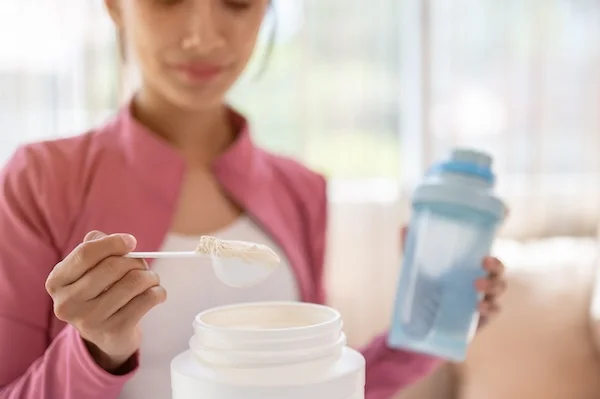 When you think of creatine, you may think of young men building muscle in the gym. But can women use it? Should they use it? What do the studies show? This is part of our multipart series on creatine. And the answer for women is yes. The reason why differs from young women, to pregnant women, to post menopausal women.
When you think of creatine, you may think of young men building muscle in the gym. But can women use it? Should they use it? What do the studies show? This is part of our multipart series on creatine. And the answer for women is yes. The reason why differs from young women, to pregnant women, to post menopausal women.
Creatine does differ between men and women.
- Women have higher intramuscular creatine concentrations (postulated due to lower skeletal muscle mass). This may explain why some studies show women respond less to creatine supplements.
- Hormone changes creatine synthesis, transport, and bioavailability.
- During menstruation, creatine kinase levels are significantly higher
- Creatine kinase levels decrease through menstrual cycle, with pregnancy, and with age.
- Pregnancy studies
- If vegetarian, the mother likely has low creatine. (meat gives 0.7 grams of creatine per 6 oz serving)
- Creatine supplements given in pregnancy in animal studies showed a protective effect against fetal death and organ damage. One animal study showed lower brain injury for babies with asphyxia if the mom had creatine and support of mitochondria.
- Low creatine levels in pregnancy are associated with low fetal growth
- The placenta during pregnancy lowers the creatine level in the mother, which may lead to low birth weight or pre term birth.
- Some think oral creatine supplements in the pregnant mother could reduce birth complications associated with cellular energy depletion.
- Women have lower creatine levels in the brain
- Creatine supplements have been reported to reduce depression. Depression is 2x higher in women during reproduction years and with puberty hormone changes.
- Studies have shown in some patients resistant to SSRI antidepressants did well with creatine supplementation.
- Young women and working out/muscle building. Of note, not all studies showed improvement in fatigue or performance. Given the studies all showed minimal risk, many advocate for its use.
- Studies show 10 weeks of creatine + resistance training increased muscle mass and strength relative to placebo.
- Another study female soccer players showed improved sprint and agility performance
- Another study showed increased upper body exercise strength and exercise capacity.
- Another study showed college aged women creatine improved knee extension muscle performance
- Post menopausal women. Here creatine seems to help with muscle mass, upper and lower body strength, and function. It likely also helps bones. ALL OF THIS IS WHEN DONE WITH RESISTANCE TRAINING PROGRAM. If not done with a resistance exercise program, there is a much smaller benefit.
- Improved 30 second chair stand/ lying prone to standing test/ arm curl test
- Less bone loss in the hip relative to placebo with one year maintenance dose of creatine
- Significant increase in upper and lower body strength and muscle mass relative to placebo in 5 grams/day of creatine for 3 months of resistance training.
How can Biohackr Health help?
- EDUCATE. Read our blogs on creatine to understand what it can do for you.
- TEST. Do an In Body Scan to see where you are starting, as the scan shows your fat and muscle percentage
- TREAT. We carry creatine. Only German, powder, creatine monohydrate. Read our blogs as to why.
- WHOLE BODY RESISTANCE TRAINING. To see the true effects, most studies emphasize the need to do creatine along with an exercise program meant to build muscle.
The information provided on this website is for general informational purposes only and does not constitute medical advice, diagnosis, or treatment. Always seek the advice of a qualified healthcare provider for any questions regarding your health or medical condition.